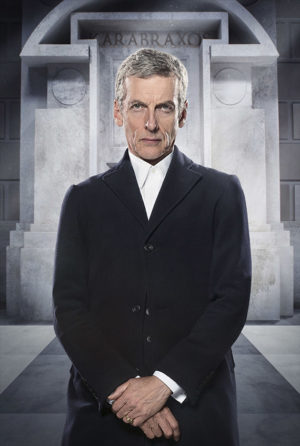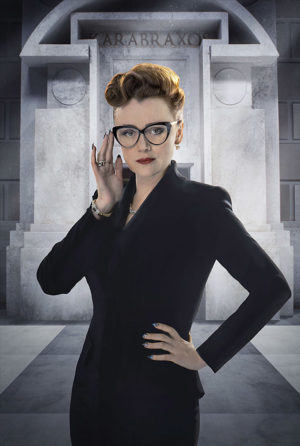2nd Opinion: Time Heist
David Selby and Connor Johnston both give their own verdict on the fifth episode of Series 8.
David’s Verdict

Time Heist seems to be a bit of a contradiction with its own quality, in that its unique selling point is how honestly cleverly-plotted it is – yet, truthfully, it’s the plot where the episode falls a bit flat. Not only is the bank astonishingly unlikely (but I daresay still feasible), but its security systems are surprisingly poor for the most secure bank in the universe. Surely there’d be far better-equipped bank robbers? Those trained their whole lives, or those with the right equipment to manage what the Doctor’s team did and more?
Nonetheless, the bank location is mostly effective for the time where the most superficial ‘business’ layer is showcased; a setting which suits an intergalactic take on Hustle. Unfortunately, the most widely-used scenes are the negative archetype of low-budget Doctor Who – multiple perspectives on the same corridor. It’s a bleak locale, and a real shame since the episode could have focused on the more stylish and sleek environment of the commercial bank. Some of the lighting was also hideously over-the-top. It felt like a last-minute sketch of primary colours.
Speaking of Hustle, many of the hallmarks of the ‘con’ genre were neatly embedded into the resolution of the episode which really seemed to echo the theme of the now-concluded BBC series. I enjoy it when another show has some influence over Doctor Who, even when it’s just my interpretation of it (though I should add, the undoing of Saibra and Psi’s deaths was frustrating, whether or not it was for a good reason).
I enjoyed Keeley Hawes’ performance as per usual, and it was refreshing to see her take on a villain instead. Madame Karabraxos was an ostensibly standard antagonist whose motivations became progressively clear. It was a welcome change to see a villain fuelled by self-loathing and regret, particularly relevant within the leitmotifs of the episode as a whole.
Time Heist was a flawed but mostly enjoyable story; certainly miles ahead of Thompson’s previous outings, and I look forward, albeit apprehensively, to the rest of the series.
Connor’s Verdict
 Suspense, mystery, excitement, timey-wimey goodness and a real sense of adventure; “Time Heist” ticks all the boxes and in theory SHOULD achieve a valid place in Doctor Who history… but at the end of the day, does the Heist deliver the goods in uniting these separate elements to achieve a memorable episode? Steve Thompson’s Doctor Who history has been anything but widely appreciated, though I continue to fall into the minority that can fathom why this is. One could only hope that in terms of general consensus, it would be third time lucky for Mr Thompson. Although in a series that has continually excelled in quality week after week, did “Time Heist” have what it takes to stand out across a line-up of stunning serials? To a certain extent, yes it did.
Suspense, mystery, excitement, timey-wimey goodness and a real sense of adventure; “Time Heist” ticks all the boxes and in theory SHOULD achieve a valid place in Doctor Who history… but at the end of the day, does the Heist deliver the goods in uniting these separate elements to achieve a memorable episode? Steve Thompson’s Doctor Who history has been anything but widely appreciated, though I continue to fall into the minority that can fathom why this is. One could only hope that in terms of general consensus, it would be third time lucky for Mr Thompson. Although in a series that has continually excelled in quality week after week, did “Time Heist” have what it takes to stand out across a line-up of stunning serials? To a certain extent, yes it did.
Thompson and Moffat deliver a script that is intact with a sense of excitement and urgency. There’s no doubt that “Time Heist” is fast paced, but it’s definitely not rushed. It works as its pace matches the tone and energy of the episode. Riddled with plot-twists and rich developments, the episode offers more than enough to entertain all members of the family, achieving a perfect balance in light and more weighted plot points.
Keeping to a stunning Series 8 record, the performances and development of both our regular and guest cast are particular highlights of the episode. Coleman and Capaldi are as always exemplary in their portrayal of Clara and the Doctor, particularly the latter as “Time Heist” offers further exploration into the 12th Doctor’s unbelievable presence in a role of authority. Almost halfway into his first series, the characterisation of Capaldi’s Doctor is becoming progressively clearer to the audience, through both his defining performance and the perception of the Doctor through the eyes of this week’s guest roles (otherwise ignorant to the stages of the Time Lord’s development) in the form of Psi and Saibra. The two guest characters are given great depth thanks to some exceptional writing and are portrayed with class through some seamless performances, but their real purpose is to showcase an outsider’s initial reception of the Doctor. Whether this description be “A Good Man” or “Professionally Detached”, the pair fulfil their roles in that respect perfectly.
Perhaps it’s the fact that my expectations were lowered due to many early reviews of the episode stating that her talent had been underused, or perhaps (more likely) it could be that any performance the talented actress delivers absolutely blows me away – but for me, Keeley Hawes brings to the table a chilling and memorable performance worthy of an abundance of praise. This is heightened by some great depth to her character in the sense that we have quite an unconventional villain in the form of the Hawes double act. This is shown through the fact that Karabraxos’ coldness is derivative from her utter loneliness and twisted greed, and Delphox’s questionable actions are motivated by essentially self-manifested fear.
The monster of the episode also lives up to the initial description of being the one of the best realised and executed monsters in the show’s history. The Teller feels like a substantial threat throughout the whole episode, perfectly complementing Delphox’s more subtle approach at villainy. The reveal of the monster’s actions being not as sinister as one originally thought no doubt casts parallels to that of last year’s “Hide” , but is more successful in the fact that “Hide’s” seemed random and with no purpose, while “Time Heist’s” serves a role in justifying the Doctor’s actions and giving substance to Karabraxos’ guilt.
Douglas Mackinnon puts forward yet another strong argument for the case of best director with the visually stunning aspects of the episode. The unique transitions are by far the direction highlight, an incredible risk investing so much of the story’s charm and spark into something as mundane as scene transitions really works in his favour showcasing a certain flare to his style of directing not overly touched on during last week’s “Listen”. It’s now with even greater excitement that I look forward to his next “Who” credit hoping for another unique take on “Flatline.” Thankfully the direction isn’t the only aspect of production that contributes to the episode’s merit, with Murray Gold’s score being particularly spectacular this week. He matches the episodes suspense and excitement to a track list which corresponds perfectly with the building tension of the script – particularly during Saibra’s “death” scene.
“Time Heist” may be branded as a classic heist story – and in many ways it is, but in true “Doctor Who” fashion – “Fair is foul and Foul is Fair”… and not everything is as it initially seems. This statement rings especially true when looking at the main resolutions of the plot, predominantly the reveal of the Doctor as the Architect, Director Karabraxos’s true identity and of course the real motivation behind the Doctor’s involvement in the heist. Each of these revelations add a layer of depth to the initially basic plot, whether it be instilling a strong political message through the script – that “Everything had a price tag” and “Evil and regret stem from greed” – or by twisting the genre of the episode in the concluding scenes to a rescue mission rather than a robbery. The themes of the episode perfectly capture the ambiguity and variety that is the core of Doctor Who’s continued success.
Through examples such as “Psi and Saibra’s death”, “The Teller’s approach” and the final reveal – it is clear where Thompson’s writing, and in particular, this episode excels is in creating memorable and impacting moments. Alas its greatest points also seems to be its greatest flaw, with “Time Heist” at the end of the day feeling more like a “Connect the Dot’s” picture rather than a renaissance masterpiece. By this I mean that while there are great standout moments for the episode, it seems that more effort and investment has been put into individual scenes rather than uniting the story with a solid plot consistent in depth and quality. It’s this feeling that may leave certain viewers left slightly unconvinced after the first viewing of the episode.
“Time Heist” is far from a perfect episode. Its basic undoing is the fact that it tries to cram too much into the given time frame, and unfortunately just falls short of being something spectacular. In saying this however, there are many redeeming qualities that ensure one’s enjoyment of the adventure isn’t completely destroyed. At the end of the day it might be a slightly forgettable episode and for some people might require an excessive amount of concentration to avoid confusion during major plot developments – but it’s still a fairly enjoyable and exciting 45 minutes, showcasing moments of Doctor Who greatness throughout its inspired script and stunning performances. “Time Heist” is a cereal box filled with exactly what it promises, there’s nothing detrimentally wrong with the cereal, and it’s a satisfying meal that meets most expectations, but lacks that special prize at the bottom of the box that has a person erupting with excitement and praise.








